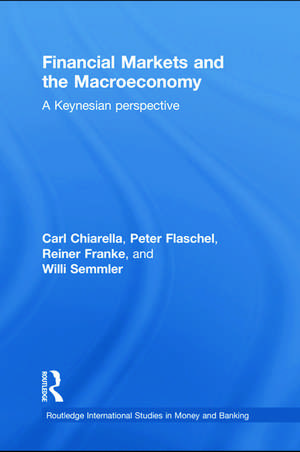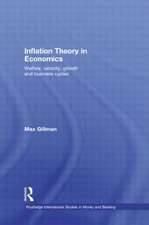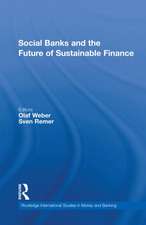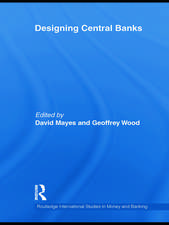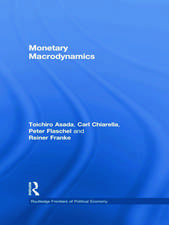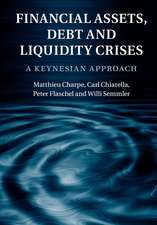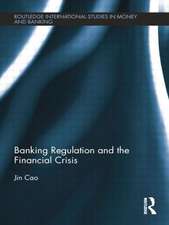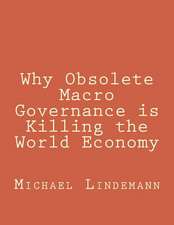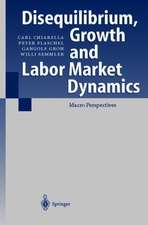Financial Markets and the Macroeconomy: A Keynesian Perspective: Routledge International Studies in Money and Banking
Autor Carl Chiarella, Peter Flaschel, Reiner Franke, Willi Semmleren Limba Engleză Paperback – 23 apr 2012
It brings to the forefront, as Keynes has suggested, the role of financial market stability for growth and macroeconomics. It criticizes theories that see economic disruptions and shocks rooted solely in the real side of the economy. It stresses the financial real interaction as the major source for macroeconomic instability and disruptions.
This important new book from a group of Keynesian, but nonetheless technically oriented economists would be of most interest to specialists and graduate students in macroeconomics and financial economics, especially those with an interest in US and European financial markets, emerging market analysis, and dynamic economic modeling.
| Toate formatele și edițiile | Preț | Express |
|---|---|---|
| Paperback (1) | 510.35 lei 43-57 zile | |
| Taylor & Francis – 23 apr 2012 | 510.35 lei 43-57 zile | |
| Hardback (1) | 1240.95 lei 43-57 zile | |
| Taylor & Francis – 22 mai 2009 | 1240.95 lei 43-57 zile |
Din seria Routledge International Studies in Money and Banking
-
 Preț: 309.94 lei
Preț: 309.94 lei -
 Preț: 325.16 lei
Preț: 325.16 lei -
 Preț: 284.40 lei
Preț: 284.40 lei -
 Preț: 313.60 lei
Preț: 313.60 lei -
 Preț: 311.41 lei
Preț: 311.41 lei -
 Preț: 307.47 lei
Preț: 307.47 lei -
 Preț: 313.17 lei
Preț: 313.17 lei -
 Preț: 341.55 lei
Preț: 341.55 lei -
 Preț: 309.87 lei
Preț: 309.87 lei -
 Preț: 310.84 lei
Preț: 310.84 lei - 9%
 Preț: 864.83 lei
Preț: 864.83 lei -
 Preț: 664.76 lei
Preț: 664.76 lei - 18%
 Preț: 1175.01 lei
Preț: 1175.01 lei - 18%
 Preț: 1122.64 lei
Preț: 1122.64 lei - 18%
 Preț: 1056.00 lei
Preț: 1056.00 lei - 18%
 Preț: 1067.14 lei
Preț: 1067.14 lei - 24%
 Preț: 148.98 lei
Preț: 148.98 lei - 25%
 Preț: 503.80 lei
Preț: 503.80 lei - 18%
 Preț: 1058.79 lei
Preț: 1058.79 lei - 26%
 Preț: 820.40 lei
Preț: 820.40 lei - 18%
 Preț: 1058.79 lei
Preț: 1058.79 lei - 28%
 Preț: 821.46 lei
Preț: 821.46 lei - 18%
 Preț: 1057.40 lei
Preț: 1057.40 lei - 26%
 Preț: 765.01 lei
Preț: 765.01 lei - 18%
 Preț: 1056.28 lei
Preț: 1056.28 lei - 15%
 Preț: 254.03 lei
Preț: 254.03 lei - 18%
 Preț: 1064.70 lei
Preț: 1064.70 lei - 18%
 Preț: 1113.25 lei
Preț: 1113.25 lei - 18%
 Preț: 702.31 lei
Preț: 702.31 lei - 18%
 Preț: 1166.68 lei
Preț: 1166.68 lei - 26%
 Preț: 849.37 lei
Preț: 849.37 lei - 18%
 Preț: 1116.38 lei
Preț: 1116.38 lei - 25%
 Preț: 851.99 lei
Preț: 851.99 lei - 18%
 Preț: 1060.87 lei
Preț: 1060.87 lei - 25%
 Preț: 823.57 lei
Preț: 823.57 lei - 18%
 Preț: 1114.70 lei
Preț: 1114.70 lei - 25%
 Preț: 824.53 lei
Preț: 824.53 lei - 29%
 Preț: 1188.26 lei
Preț: 1188.26 lei - 25%
 Preț: 853.07 lei
Preț: 853.07 lei - 18%
 Preț: 1114.30 lei
Preț: 1114.30 lei -
 Preț: 418.22 lei
Preț: 418.22 lei - 30%
 Preț: 854.10 lei
Preț: 854.10 lei - 18%
 Preț: 1060.25 lei
Preț: 1060.25 lei - 18%
 Preț: 1165.73 lei
Preț: 1165.73 lei - 18%
 Preț: 1056.00 lei
Preț: 1056.00 lei - 30%
 Preț: 851.82 lei
Preț: 851.82 lei - 18%
 Preț: 1059.48 lei
Preț: 1059.48 lei - 18%
 Preț: 1240.95 lei
Preț: 1240.95 lei - 26%
 Preț: 1187.46 lei
Preț: 1187.46 lei
Preț: 510.35 lei
Nou
Puncte Express: 766
Preț estimativ în valută:
97.65€ • 102.23$ • 80.80£
97.65€ • 102.23$ • 80.80£
Carte tipărită la comandă
Livrare economică 07-21 aprilie
Preluare comenzi: 021 569.72.76
Specificații
ISBN-13: 9780415632409
ISBN-10: 0415632404
Pagini: 512
Ilustrații: 124 b/w images and 124 line drawings
Dimensiuni: 156 x 234 x 26 mm
Greutate: 0.95 kg
Ediția:1
Editura: Taylor & Francis
Colecția Routledge
Seria Routledge International Studies in Money and Banking
Locul publicării:Oxford, United Kingdom
ISBN-10: 0415632404
Pagini: 512
Ilustrații: 124 b/w images and 124 line drawings
Dimensiuni: 156 x 234 x 26 mm
Greutate: 0.95 kg
Ediția:1
Editura: Taylor & Francis
Colecția Routledge
Seria Routledge International Studies in Money and Banking
Locul publicării:Oxford, United Kingdom
Public țintă
PostgraduateCuprins
I Real-Financial Market Interaction: Baseline Approaches, 1. Price Dynamics and the Macroeconomy, 1.1 Introduction, 1.2 Keynesian AD-AS Analysis, 1.3 References (to be adjusted), 2. Stock Market and the Macroeconomy, 2.1 Introduction, 2.2 The Blanchard Model, 2.3 Analysis of the Blanchard Model, 2.4 The Jump Variable Technique, 2.5 Conclusions, 2.6 References , 2.7 Appendix: Some Observations, 3. Bond Market, Term Structure and the Macroeconomy, 3.1 Introduction, 3.2 The Modelm, 3.3 Instability and the Jump Variable Technique, 3.4 Alternatives to the Jump Variable Technique, 3.5 Conclusions, 3.6 References, 4. Financial Markets in Open Economies, 4.1 Introduction, 4.2 Exchange Rate Dynamics in the IS-LM-PC-Model: Level-form Formulation, 4.3 Exchange Rate Dynamics in the IS-LM-PC-Model: Loglinear Analysis, 4.4 Rational Expectations in Open Economy IS-LM-PC Dynamics, 4.5 References, 5. Stock Market and Exchange Rates, II Stock Market Dynamics and the Macroeconomy: Some Extensions, 6. Output and Stock Market Dynamics with State-dependent Financial Market Reactions, 6.1 Introduction, 6.2 The Model, 6.3 Analysis of the Model, 6.4 State-of-Market Dependent Reaction Speed – An Alternative to the JVT, 6.5 Conclusions, 6.6 References, 6.7 Appendix: Relaxing Perfection, 7. Real-FinancialMarket Interaction: Implications of Budget Equations and Capital Accumulation, 7.1 Introduction, 7.2 The Blanchard Model with Instrinsic Stock-Flow Dynamics, 7.3 Intensive Form of the Model, 7.4 Analysis, 7.5 Jump-variable Coundums, 7.6 References, 7.7 Appendix: Adding the Dynamics of the Government Budget Contraint, 8. A Stochastic Model of the Real Financial Interaction with Boundedly Rational Heterogeneous Agents, 8.1 Introduction, 8.2 Model, 8.3 Heterogeneous Expectations, 8.4 Analysis of the Deterministic Skeleton, 8.5 Analysis of the Nonlinear Stochastic Model, 8.6 Conclusion, 8.7 Appendix, 9. A High-Dimensional Model of Real Financial Market Interaction: The Cascade of Stable Matrices Approach, 9.1 Introduction, 9.2 Formulation of the Model, 9.3 The Model in Intensive Form, 9.4 Subdynamics in the Real and Financial Sector, 9.5 Local Stability Analysis of the Full 7D Dynamics, 9.6 Conclusion, 10. Stock Market, Interest Rate and Output: A Model and Estimation for US Time Series Data, 10.1 Introduction, 10.2 Stylized Facts and Macromodels, 10.3 A Generalized Blanchard Model, 10.4 The Dynamics of the Model, 10.5 Discrete Time Form for Observable Variables, 10.6 Empirical Results for US Time Series Data, 10.7 Stochastic Simulations and Impulse Response Functions, 10.8 Conclusions, 10.9 Appendix 1: Stability Analysis of the Blanchard Model, 10.10 Appendix 2: The Characteristic Equation of the Generalized Blanchard Model, III Exchange Rate, Dynamics Capital Flows and Currency Crises, 11. Capital Account and Government Budget Dynamics in Perfect Open Economies, 11.1 Introduction, 11.2 The Basic One-Good Monetary Model of International Commodity Trade, 11.3 The Monetary Adjustment Process, 11.4 The Two-Commodity Extension, 11.5 The Perfectly Open Economy: Basic and Advanced Fomulations, 11.6 Twin Deficits and PPP / UIP Driven Price Dynamics, 11.7 Active Fiscal and Monetary Policy in the Perfect Open Economy, 11.8 Conclusions, 12. Twin Deficits and Inflation in the Mundell-Fleming-Tobin Model, 12.1 Introduction, 12.2 Temporary Equilibrium, 12.3 The Six Economic Regimes of the Model, 12.4 Twin Deficits and Price Level Dynamics under Fixed and Floating Exchange Rates, 12.5 Capital Account and Inflation with Interest and Exchange Rate Pegs, 12.6 Overshooting Exchange Rate Dynamics, 12.7 Conclusions, 13. Financial Crisis, Currency Crisis and Large Output Loss, 13.1 Introduction, 13.2 Stylized Facts, 13.3 The Basic Model, 13.4 Budget Restrictions and National Accounting, 13.5 Dynamics Under Flexible Exchange Rates, 13.6 Currency Crisis in a Fixed Exchange Rate Regime, 13.7 Conclusions, 13.8 References, 14. Emerging Market Economies, Currency Crisis and Price Level Adjustment, 14.1 Introduction, 14.2 The Basic Model, 14.3 Local Stability Analysis, 14.4 Currency Crises in a Pegged Exchange Rate System, 14.5 Currency Crisis and Hedging, 14.6 Adding Wage and Price Dynamics, 14.7 Stability Analysis, 14.8 The Dynamics of a Currency Crisis in the Extended Model, 14.9 Conclusions and Outlook, 14.10 Appendix 1: Balance of Payments Adjustment Processes, 14.11 Appendix 2: Empirical Results, 15. Outlook: International Capital Flows in the MFT Approach, 15.1 Introduction, 15.2 Integrating International Capital Flows into the MFT Approach, 15.3 Real-Financial Disequilibrium Dynamics: Some Basic Results, 15.4 Capital Flight, Global Players and the Emergence of Currency Crises, 15.5 Conclusions and Outlook
Notă biografică
Carl Chiarella is a Professor at the University of Technology, Sydney, Australia. He is author of Commerce, Complexity and Evolution, 2000. Peter Flaschel is Professor Emeritus at Bielefeld University, Germany. He is co-author, with Carl Chiarella, of Dynamics of Keynesian Monetary Growth, 2001. . Reiner Franke is a Lecturer at the University of Kiel, Germany. Willi Semmler is a Professor at the New School University, New York City, USA. He is the editor of Monetary Policy and Unemployment, published by Routledge in 2005.
Descriere
This important new book from a group of Keynesian, but nonetheless technically-oriented economists explores one of the dominant paradigms in financial economics: the ‘intertemporal general equilibrium approach’.
